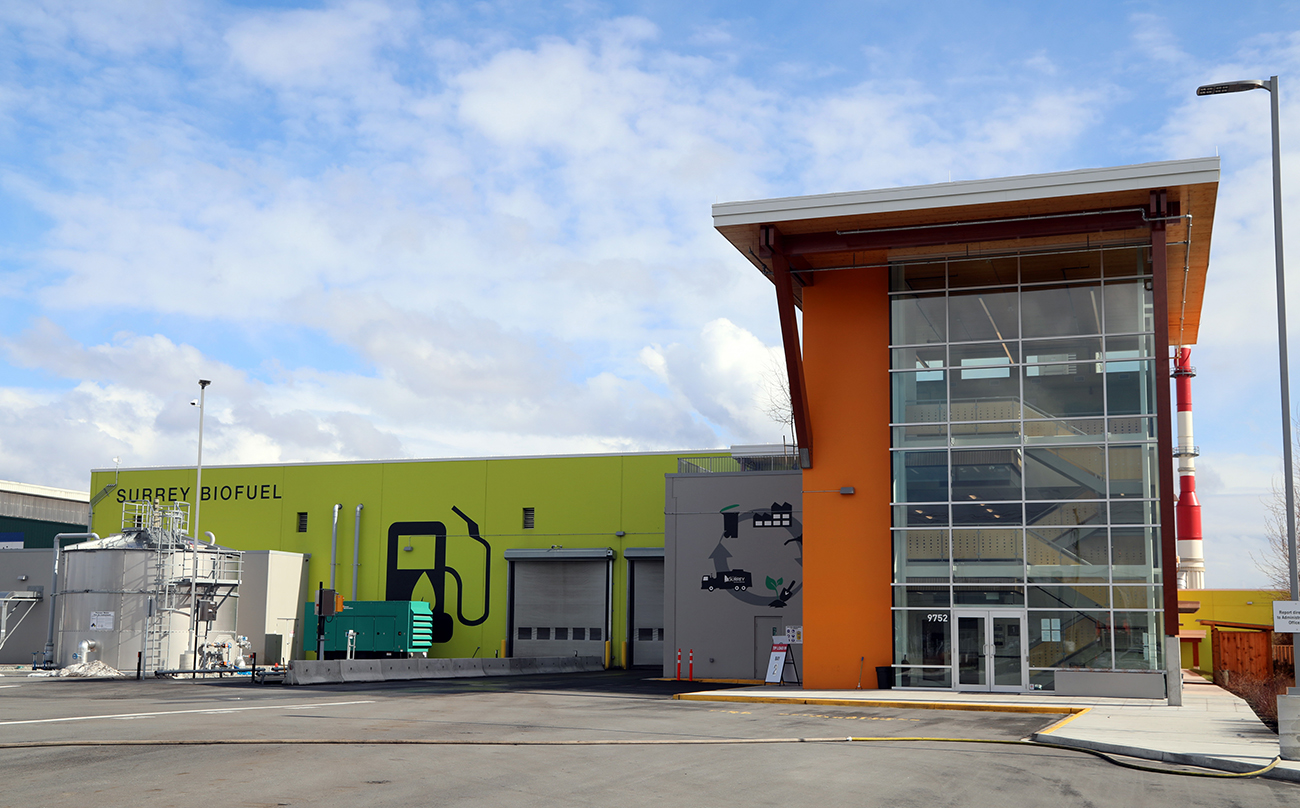WASTE PROJECT: Surrey Biofuel Facility
9-March-2018

The Surrey Biofuel Facility located in the City of Surrey, British Columbia is the most recent recipient of the Institute for Sustainable Infrastructure (ISI) Envision Platinum award. This is the first waste sector infrastructure project in North America and the third Canadian project overall to earn the prestigious Envision award for sustainability.
The largest facility of its kind in Canada, the facility is also the first closed-loop fully integrated organic waste-to-energy infrastructure facility in North America. The 14,323 square metre facility is capable of processing 115,000 tonnes per annum of residential and commercial organic waste into renewable natural gas (RNG). Approximately 120,000 gigajoules of biogas per year will be generated – enough to fuel the city’s entire natural gas-powered waste collection vehicles and its growing fleet of natural gas-powered operations service vehicles, as well as provide a renewable fuel source for the City’s District Energy System. It will also help the Metro Vancouver area achieve its regional waste diversion targets of 80% by 2020. The by-product of this facility—Class A organic compost—will also be available for use in local agriculture and landscaping applications.
“ISI is pleased to present the Surrey Biofuel Facility with the Envision Platinum award for sustainable infrastructure,” said ISI President and CEO, John M. Stanton. “This project is an excellent example of a closed-loop system that will serve the needs of the City for years to come, while significantly reducing waste, and greenhouse gas emissions that contribute to climate change.”
The Surrey Biofuel Facility is a flagship Public-Private Partnership (P3) project and is eligible for up to $16.9 million in grant funding from the federal P3 Canada Fund. It was developed between the City of Surrey and its partner, Orgaworld Canada part of Renewi plc – a leading international waste-to-product business based in the United Kingdom. Construction of the facility commenced in spring 2015 and operations began in fall 2017.
“Designing, building and operating sustainably is at the core of achieving Surrey’s vision for a thriving, green, inclusive city,” said Mayor Linda Hepner. “I am extremely proud the collaborative efforts and sustainable decision making of everyone on our Surrey Biofuel Facility design-build team who were responsible for making this remarkable infrastructure project a reality.”
Renewi will operate the facility for a 25-year period. This partnership required teamwork and close consideration of shared challenges and opportunities throughout the planning, design and operational phases of the project. Other key firms involved in this state-of-the-art project included the building design firm Stantec Consulting Ltd., the contractor Smith Brothers & Wilson Ltd., and process design/construction by Waste Treatment Technologies BV from the Netherlands.
The Surrey Biofuel Facility earned high scores in the Leadership, Climate and Risk, and Natural World categories.
Key sustainable accomplishments include:
Leadership: The City of Surrey has demonstrated tremendous leadership by intentionally selecting CNG-powered vehicles to establish the option to transition them onto biofuel energy once the City could establish a reliable local supply. From the conception of the city’s overarching organic waste collection system, the City has always intended to pursue a closed-loop system. The completion of the Surrey Biofuel facility will help to realize the City’s vision to power its fleet of waste collection and service vehicles through natural gas produced from organics collected from residents and commercial enterprises throughout Surrey.
The City’s approach to organics waste management is both scalable and transferrable to other cities in North America with established organics diversion and collection programs. In fact, other Canadian municipalities are currently exploring opportunities to replicate this strategy for a closed-loop organics system because of this project’s anticipated success.
Sustainability is a core value of the City of Surrey, and the City based part of its selection process for the consortium of partners who have been working collaboratively to design, build and eventually operate this state-of-the-art project on sustainable performance This facility will be the first organic waste facility to be completed using this approach, and one of only five solid waste P3 projects Canada-wide, a testament to the project team’s leadership.
Climate and Risk: The Surrey Biofuel Facility is expected to have a negligible impact on air pollutant emissions, and the project’s anticipated emissions are far below the California Ambient Air Quality Standards, and well below the even more stringent British Columbia Air Quality Objective.
In addition to falling below air pollution emissions standards for the province of British Columbia and Canada generally, the Surrey Biofuel Facility is expected to be net carbon negative, and it is expected to contribute to a net reduction of more than 49,000 tonnes of CO2e (carbon emissions) after one year of operation. This net reduction in carbon emissions will be primarily achieved through the transition of anaerobic digestion of organic wastes, rather than open air composting.
Natural World (NW): The project site is surrounded by industrial lands. The City commissioned a full remediation of the entire site. Metals and hydrocarbons were among those contaminants removed from the site. No previously undeveloped land was acquired for this project.
Although the project is situated in an industrial area, the project team introduced significant landscape elements to preserve species biodiversity. Vegetation will include a wide range of native and non-native shrubs, and more than 20 trees which far exceed local tree protection bylaws.
To learn more about the Surrey Biofuel Facility, please visit surreybiofuel.ca.



